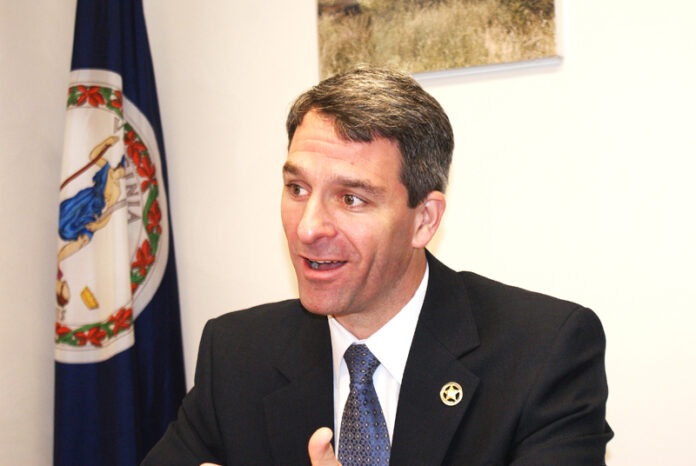
by Gene Marrano
During a visit to his Roanoke office on Peters Creek Road last week, Virginia Attorney General Ken Cuccinelli expressed confidence that the challenge he and several dozen other state AG’s have mounted to the new health care legislation passed by Congress in 2010 will survive upcoming 2012 arguments in the U.S. Supreme Court.
Winning that case could mean the end of “Obamacare” and its universal mandate that most people must have health insurance coverage or be penalized, something that Cuccinelli feels is unconstitutional. The Attorney General’s health care outreach task force, which fights Medicare fraud and other abuses of the health care system, is based out of the Roanoke office.
“We have more cases than we can get to,” said the George Mason undergraduate, who was keeping a close eye on his Patriots in the NCAA men’s basketball tourney at the time (they’ve since bowed out.) Cuccinelli actually studied engineering at Mason and called it “a very good foundation to build on.”
Cuccinelli, elected in November 2009, said the biggest surprise during his first year in office was learning just how “reactive” the Attorney General’s office can be – instead of being proactive. The most notable accomplishments “were reactions” to something that had occurred out of his office’s control.
Cuccinelli’s office has also filed suit against the Environmental Protection Agency, to require them to reopen hearings that led to their ruling that regulates carbon dioxide as a greenhouse gas. He does “worry about” the perception that Republicans like himself might be seen as anti-science or anti-green, but Cuccinelli vows that he is “cold-blooded about being objective” on such issues.
He also said the lack of logic that some lawmakers employ when making a decision purely for political purposes – without the analytical approach he learned as an engineering student – can be frustrating at times. “I still think like an engineer – not a lawyer,” said Cuccinelli, “which can be frustrating in politics. There’s an element of illogic to it all that drives me crazy.”
The “pure volume of health care fraud…that involves taxpayer dollars,” has motivated Cuccinelli to step up his efforts to weed out Medicare and Medicaid fraud, bringing the perpetrators to trial. “Elder abuse” is another component; his office recently brought charges against a business in Covington that was incorrectly training employees who worked with seniors.
The Roanoke area is often a destination for health care facilities, one reason Cuccinelli’s task force is located here. The Western District of Virginia actually initiated that indictment in Covington before the AG’s office was brought in to help with the investigation.
“Certain tools,” that are lacking for enforcement, outside of Medicare-related cases, was one issue that Cuccinelli tried to remedy in the latest General Assembly session, with mixed results. “We’re fixing that,” vows the father of seven, who attended law school at UVA and was a long time basketball official in his spare time.
Testifying before Congress last month about the health care legislation “was fun,” claims Cuccinelli, who experienced some “interesting” questions about the constitutional boundaries of the law. Like other AG’s, Cuccinelli argues that individual states should have jurisdiction over any health care insurance mandates.
Democrats on the Congressional panel tried to convince him that the new health care law was constitutional because it involved interstate commerce but Cuccinelli said that logic was “skipping four steps.” He is also part of a legal briefing team that is involved with the lawsuit.
As for health care reform itself, he does add that “there are a lot of things [both sides] can agree on,” – just not in the bill that was passed however. He hopes Congress is looking ahead, planning to craft new legislation if the current law is struck down as he expects.
Cuccinelli’s “fall back” argument is that the penalty one might have to pay if they do not purchase health insurance is actually a tax – an issue that should be left to the purview of the states. At the Supreme Court level, “they are sensitive to federalism issues … the separation between the federal government and the state government.”
The state health care mandates in Massachusetts, on the other hand, are “perfectly constitutional” in his view. Cuccinelli became a Fox News Channel favorite for a while after he filed suit against the federal government over health care. He knows the fight could be a long and arduous one: “there are judges out there ready to grant [the federal government] that incredible power. They’ve never had it before.”


